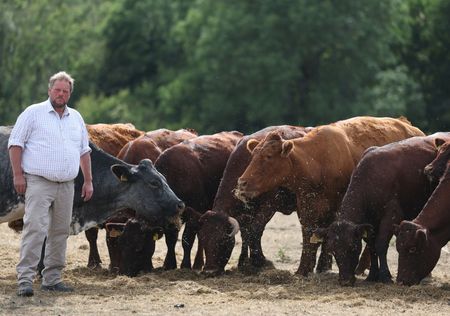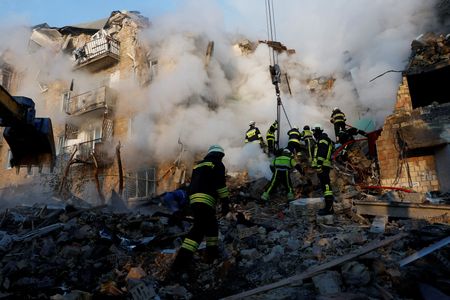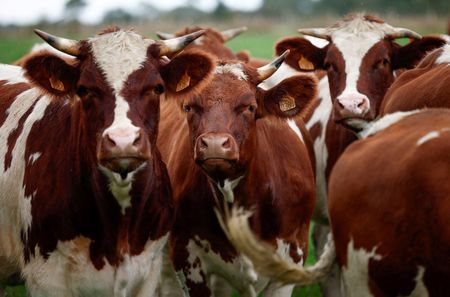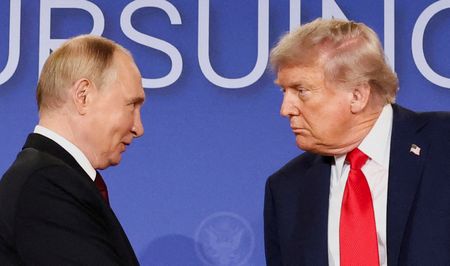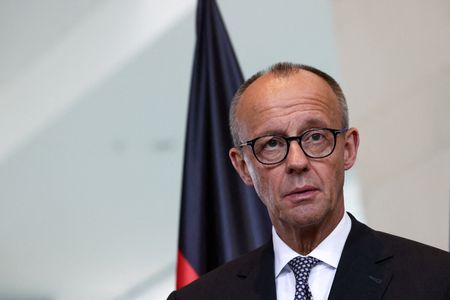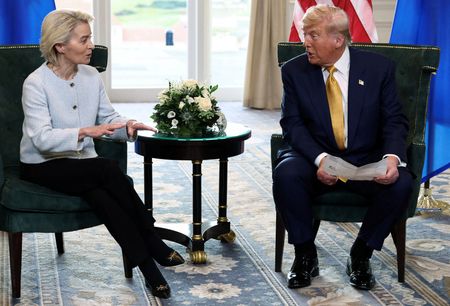By James Davey
MIDDLE DUNTISBOURNE, England (Reuters) -On David Barton’s beef farm in the picturesque Cotswolds in western England, months of heat and drought have left his 200 head of Salers, Herefords and Sussexes with nothing but parched fields to pick at.
“Look, it’s dust,” he said, kicking the ground. “This is what you would see in the (United) States or in Australia. You don’t see this in England, this is ridiculous.”
It’s the result of England’s driest spring in more than 100 years and the driest January-July period since 1929, according to data from the UK’s Met Office. It says summer 2025 will likely be the UK’s warmest since records began in 1884, moving 2018 off the top spot.
“This year is extraordinary, I have never seen anything like it,” Barton said.
Customers for beef from Manor Farm, which has been in Barton’s family for three generations, include upmarket grocer Waitrose and restaurant chain Hawksmoor.
Like many livestock farmers across England, he has had no choice but to dip into his winter feed supplies early this year, dramatically increasing his costs.
Having given up on grazing two months ago, Barton has been feeding his cows twice a day with a mix of silage, hay and cereals to ensure they get their necessary nutrients.
But his herd is still hungry, and chases his tractor across the fields for more food after being fed.
WIDER CRISIS
Barton’s predicament is typical of a wider crisis for British livestock farmers, with many concerned about the welfare of their animals and financial viability amid already-thin profit margins.
British beef production was worth over 4 billion pounds ($5.4 billion) last year, according to data from the agriculture ministry.
Barton is spending about 1,000 pounds ($1,351) a week more on feed than he normally does at this time of year.
With additional production costs not generally linked to his selling price, he faces an expensive winter.
“Unfortunately, I will have to take that hit,” he said.
The crisis also raises questions about Britain’s food security, and with producer costs rising, adds further pressure to food prices which have surged this year.
Official data earlier this month showed UK food prices were 4.9% higher than a year earlier, with beef costs a key component.
While for some arable farmers such as strawberry and raspberry growers, the sunny spring meant bumper yields, crops like brassicas – including broccoli, cabbage and cauliflower – are struggling, with warnings of tight supply.
Barton, who is chair of the National Farmers Union’s national Livestock Board, said the UK government could have done more to help the industry, which is also reeling from proposed changes to inheritance tax.
The government could have temporarily relaxed some environmental schemes so land could have been released for grazing earlier this year, he said.
Barton was worried some financially stretched farmers might be forced to reduce the size of their herds.
“I’m really concerned that farmers will take a decision to reduce their breeding cow numbers and that’s just the last thing we need to do,” he said.
($1 = 0.7402 pounds)
(Reporting by James Davey; Editing by Bernadette Baum)

